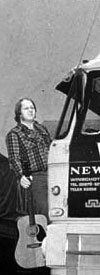 Not only (as Margaret Marks notes) has the BBC started using trucker instead of lorry-driver or patient with chronic back pain and a dietary disorder: the Americanism has been the preferred usage in Holland for years. Henk Wijngaard’s 1978 hit, Met De Vlam In De Pijp, is probably the best-known Dutch truckliedje. Try singing this translation of the chorus with the Real Media version here (bottom left, where it says Luister naar Henk):
Not only (as Margaret Marks notes) has the BBC started using trucker instead of lorry-driver or patient with chronic back pain and a dietary disorder: the Americanism has been the preferred usage in Holland for years. Henk Wijngaard’s 1978 hit, Met De Vlam In De Pijp, is probably the best-known Dutch truckliedje. Try singing this translation of the chorus with the Real Media version here (bottom left, where it says Luister naar Henk):
With a flame in my exhaust
through the Brenner Pass I tear
With my thirty tonnes of diesel,
far from home, without a care
With a flame in my exhaust,
through the endless night to see
The girl I dream of when I’m gone,
the girl who waits for me.
I’m slightly mystified as to where this all came from. Despite what historical romances would have you believe, I’ve never seen a mediaeval illustration of troubadours on white chargers. I believe that the British army started using mounted kettle drummers in the eighteenth century, but that’s rather different. Did Wagner’s Dutchman entertain passing albatrosses with sentimental ballads when he wasn’t messing up Senta’s spinning? Did Robert Louis Stevenson sing to his donkey? We don’t know, which brings us to Gene Autry, Roy Rogers and Tex Ritter.
Singing while cycling means putting up with lots of little bits of protein flying round your lungs. I’ve never been on a horse, but this makes me suspect that cowboys singing while going places (as opposed to sitting round the fire) is (sigh!) a Hollywood invention. While the commercialised singing cowboy probably forms the origin of the singing trucker, the real revolution in sung-poetry-in-motion-by-proxy surely came with the invention of the windscreen. And, since most people’s first motorised experience was in tram, train or bus, I suspect that we need to look to singing [public service vehicle] conductors for the first real-life working troubadours.
Little seems to be known of Holland’s singing tram conductress, Selma van Loggem, but Duke Baysee’s reputation has spread far and wide, his Sugar Sugar (Arista) having reached no 1 in South Africa and no 30 in the UK. Despite this he still apparently collects tickets, plays harmonica and sings (bottom of the page) on the number 38 route in Hackney (PDF).
Buy Robert McDowell’s Cowboy Poetry Matters: From Abilene to the Mainstream: 
Similar posts
- A passion called asparagus
The kinky Murcian waiters clique is anxious to watch rude muscles bulge and divine blood flow in Mel’s Pash and will - When Javans ruled Spain
The other day I serendipited upon a review in Bijdragen tot de taal-, land- en volkenkunde van Nederlandsch-Indië (1853) of Abraham - I quite like Radio Occitania
If you are immune to the narcissim of small differences and accept the notion that Valencian is a dialect of Catalan, - Tolstoy’s finch, linnet mania, and a false etymology of “shibboleth”
The following description of birdsong contests is taken from Josep Pla’s brilliant anecdotography of Rafael Puget, Un señor de Barcelona, and - Cowbike drawing competition
With reference to several recent items (1, 2, 3), Emma Moo-Cow bets we can’t produce a cow on a bike. Well,

I think a decent horse cost about as much as 10 slaves in the thirteenth century, so it’s not surprising troubadours couldn’t afford the top models.
Where?
Try Robert I. Burns, Jews in the Notarial Culture: Latinate Wills in Mediterranean Spain, 1250-1350
I can feel a calculator coming on.
The style of Dutch cowboy songs is interesting. Coyboy Billy is a Tirolean yodel song while Cowboy Meisje is more like old hot-style jazz.
Chronic research underfunding, that’s why. How many mid-C20th Dutch singers of ridiculous songs got grants to study authentic vulcher culcher, eh?!